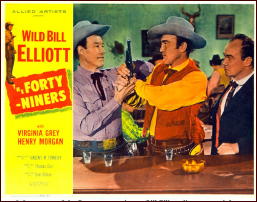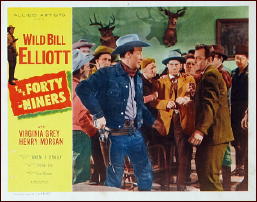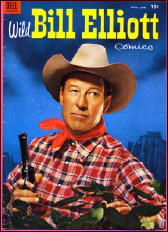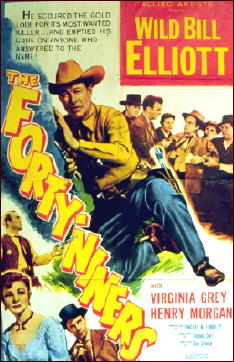Mon 5 May 2014
A Western Movie Review by Dan Stumpf: THE FORTY-NINERS (1954).
Posted by Steve under Movie stars & directors , Reviews , Western movies[9] Comments

THE FORTY-NINERS. Allied Artists / formerly Monogram, 1954. “Wild Bill†Elliott, Virginia Grey, Harry Morgan, John Doucette, Lane Bradford. Written by Daniel B. Ullman. Directed by Thomas Carr.
But first a word about Wild Bill Elliott, born Gordon Nance, who started out his career at Columbia under the name Gordon Elliott as an all-purpose and mostly uncredited supporting player until he landed the lead in the 1938 serial The Great Adventures of Wild Bill Hickok, which led to a series of low-budget westerns at Columbia, billed as Wild Bill Elliott and sometimes playing Hickok in adventures that, as you might expect, had little to do with the actual James Butler Hickok.
Many of these were a cut above average, and a few, directed by Joseph H. Lewis, even artistic at times, but in ’43 he left Columbia for Republic. There the budgets were bigger and the films generally more fun, but it was still a loss in prestige to go from the smallest of the Major studios to the biggest of the Minors, which was Republic’s place in Hollywood’s caste system.

Republic even tried to lift Elliott out of the “B†ranks for a time, upping his budgets, offering more “adult†story lines and dropping the “Wild†from his billing, but eventually he returned to “B†status. His last film at Republic, The Showdown, was shot entirely on studio sets with back projection, reflecting Republic’s growing disinterest in the budget prairie film in general.
At which point Elliott moved to Monogram, which was definitely a step down, but surprisingly his films here got even more interesting — not better made, but with distinctly off-beat characterizations and story lines.
Elliott himself, billed once again as “Wild Bill Elliott†smoked and drank, cussed now and then, and wasn’t above dealing out nastiness when called for. He even played an occasional outlaw, though reformed by film’s end, and in one movie he beats information out of a bad guy while holding him at gunpoint—hardly sporting, that, and unheard of in the better class of B westerns.

In 1955 even Monogram tired of the low-budget western and moved Elliott into a series of detective stories, but Elliott had ended his sagebrush career with a flourish of sorts, as borne out in The Forty-Niners.
This starts out with Dragnet-style voice-over narration, and when I say “Dragnet-style†I mean you can practically hear Jack Webb’s flat monotone in Wild Bill Elliott’s voice. Her gives dates and times, tosses in cop-comments like “It was a routine assignment†and even synopsises the outcomes in Court.
The wonder is that writer Daniel Ullman (who made kind of a specialty out of detective/westerns) still wrought a perfectly fine western out of all this.
Wild Bill plays a U.S. Marshall cold on the trail of the owlhoots who ambushed a fellow-lawman. His only lead is a gambler (played by Harry Morgan, who also featured in Elliott’s last Republic picture) who can lead him to the baddies as long as he doesn’t realize that’s what he’s doing. Morgan plays the kind of good/bad guy later personified by the likes of Arthur Kennedy, and he does it pretty well, grinning and joking as he cheats at cards and blackmails killers who are now comfortably ensconced as respectable citizens.
His only weakness is a soft heart for the gal he left behind and an aversion to cold-blooded murder when that becomes necessary to eliminate Elliott, whom he’s come to respect and admire. It’s an interesting part in a movie that moves along at a brisk clip, with plenty of action and enough curves in the plot to keep you guessing, even as you realize the pre-ordained outcome dictated by the genre, and reflecting that as Wild Bill took his last ride into the sunset, he did it with a certain amount of style and the quiet dignity that becomes a western hero — even a cut-rate hero ending his days in the B-movies.

May 5th, 2014 at 6:36 pm
I’ve always liked Wild Bill Elliott and I can even recommend his last 5 films which were detective cases in the dragnet mode. Warner Archive recently released a box set of all 5 detective movies.
Dan, you didn’t mention Wild Bill’s signature statement. When he says “I’m a peaceable man”, all hell will soon break loose.
May 5th, 2014 at 6:46 pm
I was a fan of Wild Bill, too. I think it was the name as much as anything. I remember him as Red Ryder as much as for his other roles.
May 5th, 2014 at 9:57 pm
I was also a big fan. Didn’t he wear his guns backward in the holsters or am I thinking of someone else?
May 5th, 2014 at 10:35 pm
I’m wondering if you’re thinking of Guy Madison, when he played Wild Bill Hickok on the long-running TV series.
May 5th, 2014 at 11:02 pm
I just looked at THE HOMESTEADERS and yes Wild Bill Elliott does wear his guns backward. Both of them.
There’s a great blog I check about western films and they will be having Bill Elliott Wednesdays. The link is http://fiftieswesterns.wordpress.com
May 6th, 2014 at 4:51 pm
As I grew older Wild Bill soon began to edge many of the other cowboy heroes out because of the complexity of his persona in many films. You knew he wasn’t going to be completely bad, but you had to wonder how close to the line he was going to come.
He has another B mystery connection, he plays a playboy suspect in the Crime Club film of Jonathan Latimer’s Lady in the Morgue.
He did a very good adult western with Walter Brennan that I recall fondly and being a Texan my favorites were Gallant Legion and The Great Texan.
Does anyone recall the name of the one where he plays the masked bandit with a mustache? I think it is In Old Sacramento or even In Old Los Angeles, but just about everyone seemed to do at least one In Old something or other western.
May 6th, 2014 at 5:04 pm
Re Wild Bill Elliott
David, the title In Old Sacramento was his first A film lead and he dies at the conclusion. In Old Los Angeles has him playing a law officer, undercover, with John Carroll the mustachioed bandit. The Fabulous Texan, also with Carroll, as was Wyoming (1947). This was his most successful film. The picture with Walter Brennan is The Showdown and his last film for Republic. It went out as an A, but like The Last Bandit, returns were down and they let him go. I don’t care for the Allied Artist films he did at all. They did have a kind of dour atmosphere, but scripts and production values were meagre.
Oh, and Dan — Gordon Elliott was at Warners for most of the time he was doing bits, billed and unbilled, but he was dully effective with Gene Autry in Boots And Saddles. I think he was always stiff and dull until being cast as Wild Bill and voila — things kicked into gear. I think that during his Republic heyday was effective and brought a lot to the table.
May 6th, 2014 at 8:34 pm
Thanks Barry, I knew The Great Texan was wrong but hoped someone would correct it.
I agree about his stiffness prior to Wild Bill, there is no sign of the quiet charisma that would mark his cowboy roles. I wonder if his skills just improved or if he recognized that westerns were his big chance and put more into it?
Some of those last westerns suffered more from the audiences inability to accept him as an adult actor in adult westerns than any flaw in themselves, that and being in black and white for the most part hurt too. I’m not sure the adult audience understood they weren’t going to see a formula B western in his later work.
And while I’m a huge fan of many of the B cowboy stars, Elliot was probably the only one you could honestly call cool. And he is also the only one you had to worry about shooting someone in the back if need be.
May 6th, 2014 at 10:12 pm
Concerning shooting someone in the back, I believe this happened more often in the real west than we suspect. In films and the western pulps the hero usually goes up against the professional gunman face to face and wins. In reality, there had to be more bushwacking going on and guys getting shot in the back.
Not much chance of winning against a fast gunman because most cowboys were not fast on the draw, etc. Not sure if there ever was a high noon type shootout.
One of my favorite scenes occurred in COLT 45 TV series. The villain is slapping everyone around and no one wants to face him face to face. But he turns his back for a second and a half dozen cowboys slap leather and fill him full of holes. So many bullets in his back they can’t figure out who should get the reward for killing him.